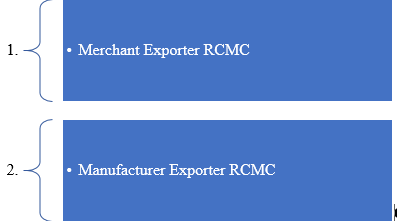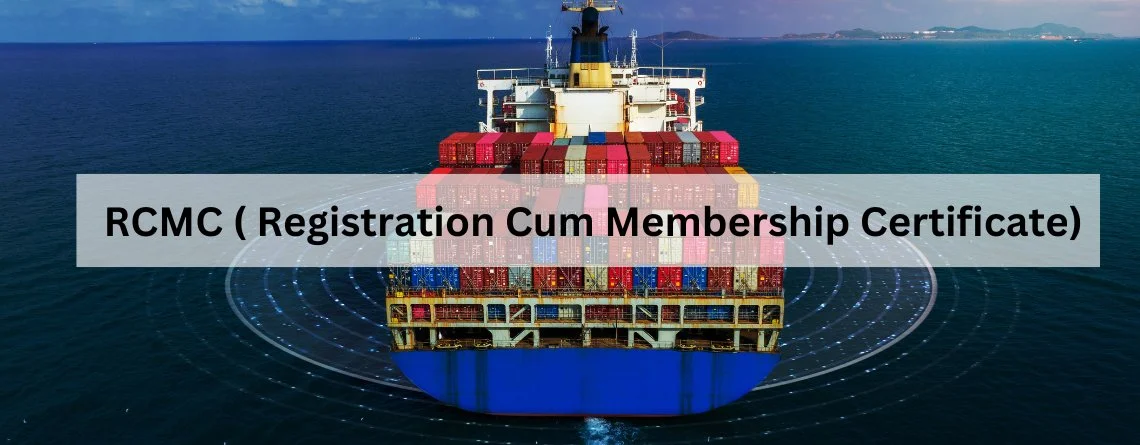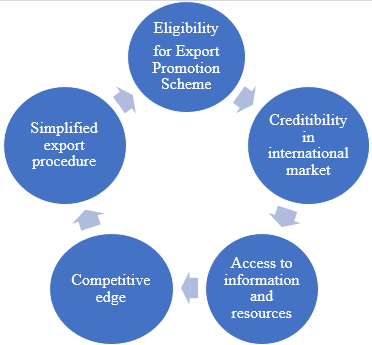RCMC ( Registration Cum Membership Certificate)
A Registration cum Membership Certificate (RCMC) is a document issued by the Export Promotion Council (EPC) or other relevant authorities in India to exporters. The RCMC serves as proof of registration with the EPC and membership in the council, which represents the interests of exporters in various industries.
To obtain an RCMC, an exporter must apply to the relevant EPC and provide information about their business, such as the nature of their export activities, the products they export, and their export turnover. The EPC will review the application and issue the RCMC if the exporter meets the criteria for membership.
The RCMC typically includes information such as the exporter’s name, address, and contact details, as well as the period of validity of the certificate. The RCMC may also include details about the products or services that the exporter is authorized to export.
The RCMC is an important document for exporters as it allows them to take advantage of various export promotion schemes and benefits provided by the government, such as reduced customs duties, tax exemptions, and financial assistance. It also helps to establish the credibility of the exporter in the international market and provides a competitive edge over other exporters who are not registered with the EPC.
Benefits of RCMC
The Registration cum Membership Certificate (RCMC) is a valuable document for exporters in India, as it provides several benefits, including:
- Eligibility for export promotion schemes: The RCMC certificate serves as proof of registration with the Export Promotion Council (EPC) and membership in the council. This makes the exporter eligible for various export promotion schemes and benefits provided by the government, such as reduced customs duties, tax exemptions, and financial assistance.
- Credibility in the international market: The RCMC certificate helps establish the credibility of the exporter in the international market. It demonstrates that the exporter is registered with a recognized trade body and has met certain eligibility criteria.
- Access to information and resources: Exporters with an RCMC certificate have access to information and resources provided by the EPC, such as market intelligence, trade data, and business opportunities.
- Competitive edge: The RCMC certificate provides a competitive edge over other exporters who are not registered with the EPC. This is particularly important in industries where there is intense competition.
- Simplified export procedures: Exporters with an RCMC certificate can avail of simplified export procedures, which reduces the time and cost of exporting goods.
In summary, the RCMC certificate provides several benefits to exporters in India, including eligibility for export promotion schemes, credibility in the international market, access to information and resources, a competitive edge, and simplified export procedures.
Form used in RCMC
The form used for the RCMC application is known as the “Application Form for Registration Cum Membership Certificate” or “RCMC Application Form”. This form is provided by the EPC or authority and is available on their website or can be obtained in person from their office.
The RCMC application form typically requires the exporter to provide details such as their name, address, contact information, Import Export Code (IEC) number, PAN card details, bank account details, and information on the type of export activity and the products being exported. The exporter may also be required to submit supporting documents along with the form, such as proof of business registration, address proof, and GST registration certificate.
It is important for exporters to carefully fill out the RCMC application form and submit all required documents to ensure a smooth and timely processing of their RCMC application.
Fees for obtaining RCMC
The fees for obtaining a Registration cum Membership Certificate (RCMC) can vary depending on the Export Promotion Council (EPC) or the relevant authorities in India that issue the certificate. Each EPC sets its own fee structure for RCMC issuance.
Typically, the fee for obtaining an RCMC is based on the exporter’s annual export turnover or the value of the products that they intend to export. The fee may also depend on the duration of the RCMC, which can range from one to five years. The minimum fee in RCMC is Rs.5900.
In general, the fees for obtaining an RCMC are relatively low and affordable for most exporters. However, it is important to check with the relevant EPC or authority to confirm the exact fee structure and requirements for obtaining an RCMC.
GST charge on fees
Goods and Services Tax (GST) is applicable on the fees for obtaining a Registration cum Membership Certificate (RCMC) in India. The rate of GST applicable on the RCMC fees is determined by the government and is subject to change from time to time.
The current rate of GST applicable on the RCMC fees is 18%. This means that if the RCMC fee is, for example, Rs. 10,000, the total cost to the exporter will be Rs. 11,800 (RCMC fee of Rs. 10,000 + GST of Rs. 1,800).
It is important for exporters to keep in mind the applicable GST rate while calculating the total cost of obtaining an RCMC. The GST component should also be included while claiming input tax credit (ITC) for the RCMC fees paid.
Validity of RCMC
The validity of a Registration cum Membership Certificate (RCMC) in India is typically one to five years, depending on the policy of the Export Promotion Council (EPC) or the relevant authorities that issue the certificate.
The validity of the RCMC is mentioned on the certificate itself and the exporter must renew it before the expiry date to continue to enjoy the benefits provided by the EPC. If the exporter fails to renew the RCMC before the expiry date, they will have to apply for a fresh RCMC, which may result in additional costs and delays.
It is important for exporters to keep track of the validity of their RCMC and renew it in a timely manner to avoid any disruptions in their export operations. Additionally, exporters should also ensure that they comply with the ongoing eligibility criteria set by the EPC to maintain the validity of their RCMC.
Types of RCMC

There are two main types of Registration cum Membership Certificate (RCMC) in India, which are as follows:
- Merchant Exporter RCMC: This type of RCMC is issued to businesses that are involved in the export of goods. Merchant exporters purchase goods from the domestic market and export them to foreign countries. The Merchant Exporter RCMC is issued by the relevant Export Promotion Council (EPC) based on the nature of goods to be exported.
- Manufacturer Exporter RCMC: This type of RCMC is issued to businesses that manufacture and export goods. The Manufacturer Exporter RCMC is issued by the relevant EPC based on the products manufactured and exported by the business.
Apart from these two main types of RCMC, there are also other types of RCMCs issued by specific EPCs for specific industries. For example, there are separate RCMCs for electronics, textiles, leather, handicrafts, and so on.
It is important for businesses to obtain the relevant type of RCMC based on their business activities and industry to be eligible for various export promotion schemes and benefits provided by the government.
Documents required for RCMC
The documents required for obtaining a Registration cum Membership Certificate (RCMC) in India may vary depending on the Export Promotion Council (EPC) or the relevant authority that issues the certificate. However, some of the common documents required for obtaining an RCMC include:
- Import Export Code (IEC) issued by the Directorate General of Foreign Trade (DGFT).
- PAN Card of the exporter or the firm.
- Bank Certificate or a cancelled cheque, indicating the name and account number of the exporter.
- Business registration documents, such as partnership deed or memorandum of association and articles of association.
- GST Registration Certificate.
- Proof of address of the exporter, such as a utility bill, lease agreement, or property tax receipt.
- Details of the export products, such as description, value, quantity, and HS code.
The specific documents required may vary depending on the type of RCMC, the EPC or authority issuing the certificate, and the nature of the export activity. Exporters should check with the relevant authority to confirm the exact document requirements for obtaining an RCMC.



Leave a Reply